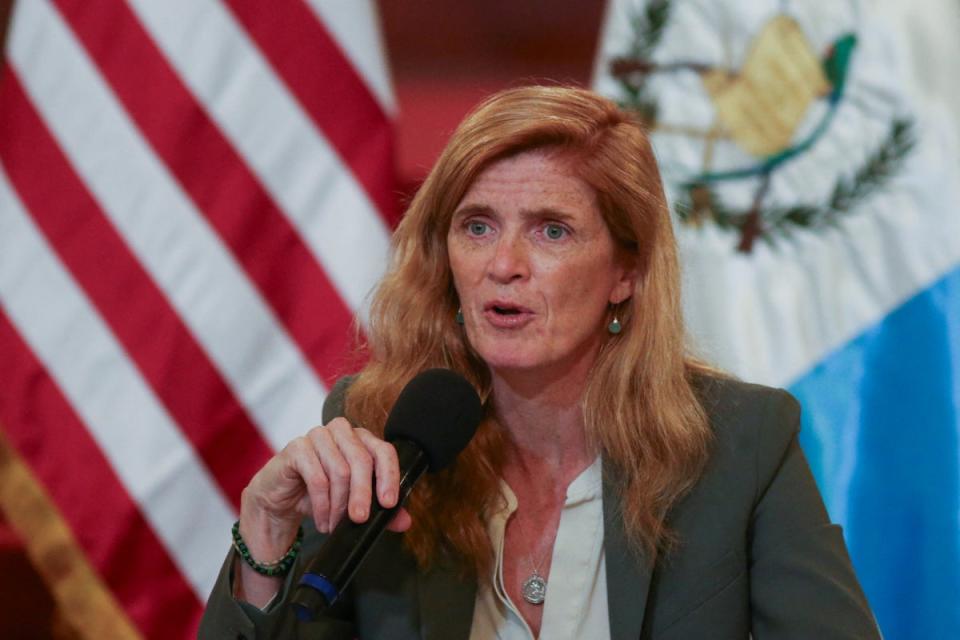Samantha Power, who wrote a book on genocide, confronted by own USAID staff for failing to speak out on Gaza
The head of the United States Agency for International Development was publicly criticized by the agency’s current and former employees who urged her to speak out against US support for Israel’s military campaign in Gaza.
Samantha Power – who leads one of the world’s largest aid organisations and wrote the Pulitzer Prize-winning book A Problem from Hell: America and the Age of Genocide – was confronted during her unrelated remarks on climate change in Washington DC on Tuesday.
Agnieszka Sykes, a global health specialist at USAID who told The Washington Post that she left her job at the agency last week, had interrupted a speech on “The End of Climate Shocks” at Johns Hopkins University’s Bloomberg Center.
“You wrote a book on genocide and you’re still working for the administration: You should resign and speak out,” Ms Sykes said.
During a question-answer segment after her remarks, Hannah Funk, who identified herself as a contract specialist at USAID, told Ms Power: “The US-funded genocide in Gaza has really left us unable to be more of a leader in climate change and all the other development in humanitarian issues those of us in USAID care so much about. How are you leading us to reckon with and overcome this hypocrisy?”
As Joe Biden’s administration and members of Congress face internal dissent challenging US support for Israel’s military campaign in Gaza, Ms Power is overseeing a sprawling international aid agency divided over US military support for the war amid growing calls for a ceasefire.
Ms Power’s book questions why American leadership has failed to stop global atrocities after vowing “never again”. In her statements on Tuesday, Ms Power underscored the growing humanitarian crisis in Gaza and inadequate supplies of food, water and medical supplies for 2 million displaced Palestinians.
“We have families right now living in unimaginable conditions. In addition, the greatest loss of life has come from the war itself, and from the bombing. More than 25,000 civilians have been killed,” she said.
“There is not a single call that President Biden makes … that doesn’t put the importance of civilian protection and international humanitarian law at the top of the conversations,” she added.
She also appeared to defend Israel’s military actions, stating that “the people who carried out October 7 would do it again, in a heartbeat, if they could,” referencing the Hamas-led attack that killed 1,200 people in Israel.
“And, that fundamental fact, makes it impossible for us to look at the situation and say that it can’t happen again,” she added. “When Hamas leadership is at large, those same kinds of attacks, the same kind of hostage-taking, the same kind of sexual assault, that can happen again. And so, we have had within USAID, a lot of discussion, and I very much hear and completely respect the views across the agency.”

A series of protests and dissent memos among administration staffers included a November letter from more than 1,000 USAID officials urging the Biden administration to call for an immediate ceasefire.
Similar efforts from members of Mr Biden’s staff and presidential re-election campaign, as well as staff among members of Congress and across federal agencies, have repeatedly called on the president and congressional leadership to support calls for a ceasefire.
On Wednesday, a federal judge in California called on the president, Defense Secretary Lloyd Austin and Secretary of State Antony Blinken to “examine the results of their unflagging support of the military siege against the Palestinians in Gaza.”
The judge noted that a preliminary ruling from the International Court of Justice found that Israel’s conduct in Gaza could plausibly amount to genocide.
Ms Power told the audience at Johns Hopkins that the agency and the Biden administration are “working aggressively now to secure a humanitarian pause that would allow a respite from the war to allow the release of hostages and a “dramatic increase in the scale of supplies to get in Gaza.”
“Civilian life, human life, is sacred. Just as the horror that was inflicted on October 7 galvanised outrage, so it is important that we mobilize everything we can, in terms of diplomatic resources, humanitarian resources, to reach the needs of families,” she said.
In a statement to The Independent, a spokesperson for USAID said Ms Power and the agency’s leadership “are deeply engaged with our workforce, who work tirelessly to support vulnerable people in Gaza and around the world.”
“Since the start of this conflict, Administrator Power and other agency leadership have held numerous engagements with staff in the US and at USAID Missions around the world to discuss the US and USAID response to the conflict, offer appreciation for their work, and hear a range of perspectives and concerns,” the statement added.


